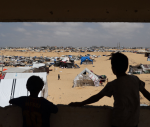You are here
First recognise Palestinian humanity
Apr 02,2024 - Last updated at Apr 02,2024
Guys in white shirts and ties in Washington and their counterparts in Israel are sitting around tables making plans for after Israel ends its genocidal assault on Gaza (if they ever end it). From what I have read, their plans are either cruelly insensitive or downright delusional, focusing only on who runs what and how it will be run, ignoring the wounds inflicted by this war that will define reality for a generation or more. The loss and trauma inflicted on millions of Palestinian victims are never factored into calculations by the Israelis or their enablers in Washington. To them Palestinians have always been mere pawns on a chessboard.
Herein lies the root of the entire conflict. From the beginning, neither the British nor early Zionist leaders saw the indigenous Arab population as full human beings. When learning of the British plans to secure a Mandate and turn it over to the Zionist movement for a Jewish colony in Palestine, the Americans sent a team to survey Arab opinion. They found near total Arab rejection of both the Mandate and the Zionist enterprise. On hearing the results, the British Lord Balfour was quoted saying, “In Palestine, we do not propose…consulting the wishes of the present inhabitants of the country…Zionism, be it right or wrong, good or bad, is…of far profounder import than the desires and prejudices of the 700,000 Arabs who now inhabit that ancient land.”
The founders of the Zionist movement shared this sentiment. They first sought “a land without a people…for a people without a land.” Upon finding natives there, Herzl wrote that they would be used to clear the area of dangerous animals, and then evacuated to other lands.
Early Zionists wrote that the Jewish people were “more industrious and more able than the average European, not to speak at all of the inert Asiatic and African”. They believed that their colony would be a “rampart of Europe against Asia, an outpost of civilisation as opposed to barbarism”.
This deeply racist mindset found its best expression in the 1960 film “The Exodus” that transposed the American “cowboys and Indians” storyline onto the Israeli-Palestinian conflict—with Israelis as pioneers seeking freedom for their families, facing hordes of savages who sought only to kill them. The conflict was reduced to “Israeli humanity versus the Palestinian problem”. They needed a way to defeat or subdue the “problem” so Israeli humanity could realise their dreams.
Too many policymakers in Washington still have this lens. As they grieved with the Israelis over the October 7th trauma, they identified with Israelis as real people, while Palestinians remained an abstraction receiving little sympathy. It has taken months for any real expressions of compassion for tens of thousands Palestinians dead and the attendant devastation of Palestinian homes and cities.
Early in this war, I spoke with a senior White House official who expressed his pain at October 7th’s horrors. I told him that I understood and asked him to also consider Palestinian trauma. He angrily dismissed my appeal as “whataboutism”, suggesting that my intent was to justify or diminish Israelis’ suffering. I reminded him that it was not either Palestinian or Israeli suffering. It was both.
Five months later, with 32,000 dead Palestinians and Gaza on the brink of famine, the administration is finally paying attention. But it is too little, too late.
Despite the White House focus on the humanitarian crisis, lack of food, water, medicine and housing, the deeper toll inflicted on Palestinians is still unappreciated. If they recognised the true toll, they would not be dropping boxed lunches from the sky or building a pier, nor thinking that a reformed Palestinian Authority doing Israel’s dirty work was an acceptable “day after” scenario.
If they saw Palestinians as equal human beings, they would tell the Israelis to stop bombing, remove the block on UNWRA and support a UN resolution to send international forces into Gaza and the West Bank, ending the illegal Israeli occupation of both. They’d set up an international relief and reconstruction effort to rebuild Gaza, and send in teams of doctors to address the war’s physical and psychological wounds. They would, in other words, demonstrate the sense of urgency, compassion and care that human beings deserve.
The writer is president of the Washington-based Arab American Institute














Add new comment